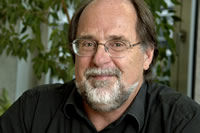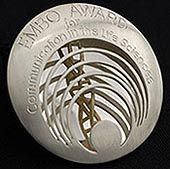Viruses on the run
ETH Zurich Professor Ari Helenius awarded Benoist Prize
ETH Zurich Professor Ari Helenius has been awarded the 100,000 Swiss francs Marcel Benoist Prize 2007 for his groundbreaking research in biochemistry. Why do we catch colds? How do viruses get into cells? In pursuing this central question, Ari Helenius, Professor of Biochemistry at ETH Zurich since 1997, and his team have pioneered research in this field. For his efforts, Professor Helenius has been awarded the 'Swiss Nobel Prize'. "This award is not only for me but for the entire team as well a confirmation of our long years of work, and demonstration of the good working conditions that exist for researchers at ETH Zurich", Professor Helenius said. Discoverer of Endosomes Viruses are parasites that need to feed from living cells in order to replicate. The membrane covering each cell creates an effective barrier against infiltration by undesired substances. The supposition to date had been that viruses invade cells through fusion with the plasma membrane, in the same way that two soap bubbles collide with one another, then fuse. Helenius found instead that the viruses are carried by a cellular mechanism to an internal location in the cytoplasma where the lower pH value promotes penetration into the cytosol and eventually the nucleus. Working from this finding, Helenius discovered the socalled endosome, a structured, intracellular membrane bubble that provides the acidic environment that allows the fusion of virus and cell. Increased insight into cellular quality control Virologists are not the only ones to benefit from Helenius's reseach. Cell biologists have also profited. Helenius's work with viruses has led to the identification of underlying mechanisms of cell biology. One of these mechanisms is a quality control system that newly synthesized proteins, such as hormones and enzymes, have to pass before they are deployed by the cell to perform their func-tion. While studying the synthesis of viral proteins in the infected cell, Helenius and coworkers observed that defective, incorrectly folded viral proteins failed to be transported to the surface of the cell. The quality control system underlying this phenomenon could be shown to also apply to cellular proteins. By subjecting proteins to a quality check, cells make certain that newly synthesized proteins are correctly assembled and folded and do not endanger the functionality of the cell. Medicinal uses By far the greatest importance of Helenius's research with viruses in the area of medicine is how influenza and other viruses infiltrate cells. Proof that there is a system of quality control has additionally led to recognition that defects in the mechanism are the causes of certain illnesses such as particular forms of diabetes and cystic fibrosis, an inherited illness that occurs with relative high frequency in Europeans. This makes Professor Helenius's work of direct interest in the health field.

Professor Ari Helenius
ETH Zürich, Monika Estermann, Zürich
Most read news
Topics
Organizations
Other news from the department science

Get the life science industry in your inbox
By submitting this form you agree that LUMITOS AG will send you the newsletter(s) selected above by email. Your data will not be passed on to third parties. Your data will be stored and processed in accordance with our data protection regulations. LUMITOS may contact you by email for the purpose of advertising or market and opinion surveys. You can revoke your consent at any time without giving reasons to LUMITOS AG, Ernst-Augustin-Str. 2, 12489 Berlin, Germany or by e-mail at revoke@lumitos.com with effect for the future. In addition, each email contains a link to unsubscribe from the corresponding newsletter.


















































